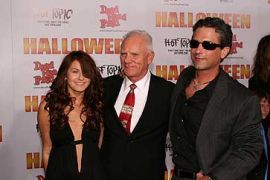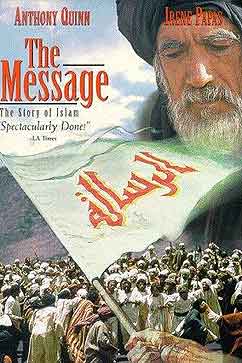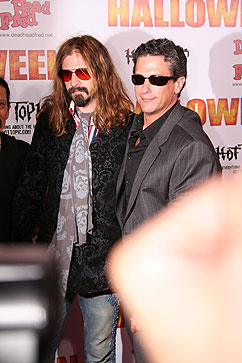Halloween producer’s epic plan
As the 1978 film’s remake hits the screens, Malek Akkad’s heart is set on Saladin.

 |
| Poster of the 1976 film The Message produced by the late Moustapha Akkad [Courtesy Trancas International] |
In November 2005, Moustapha Akkad, the Syrian-American executive producer of the Halloween franchise, was killed in a bomb blast in Amman.
Known in the Middle East as the director of films about Islam and Arab nationalism, Akkad died before completing his most ambitious project – Saladin.
Keep reading
list of 4 itemsUK returns looted Ghana artefacts on loan after 150 years
Fire engulfs iconic stock exchange building in Denmark’s Copenhagen
Inside the pressures facing Quebec’s billion-dollar maple syrup industry
But Malek, Akkad’s son, has pledged to continue where his father left off.
“My father had been semi-retired at the time of his death,” he said. “He had been focusing on overseas film projects while I was responsible for the North American film projects such as the Halloween series.”
“Now that I have finished Halloween I am finally free to re-visit the making of Saladin.”
Highly anticipated, and perhaps controversial, the film was to illustrate the character of Saladin as a Muslim general and tactician during the Crusades and was designed to offer a different perspective of Islam at a time when terrorism and extremism dominated the east-west discourse.
Throughout his career, Moustapha Akkad sought to create an atmosphere of understanding between Islam and the West.
In 1976, he directed Arabic and English versions of The Message, a film about the Prophet Mohammed.
This was followed by 1981’s Lion of the Desert, a film about a Libyan school teacher who stood up to Italy’s military ventures in the early 1920s.
Clear allusions
The allusions and parallels were clear – a highly modernised foreign army (European, in this case) invades and occupies Arab lands.
The film won rave reviews in the Arab world but received little commercial attention in Hollywood.
Nevertheless, Malek Akkad says he is determined to continue his father’s mission to change the way Tinsel Town and mainstream western media stereotype Arabs and Muslims.
“My being here in Hollywood, I see it every day and the image of Arabs here is horrible. Right now, we are working on several scripts that deal with political issues but are not propagandistic.”
Akkad explained that his father believed that Arabs themselves must work within the system to challenge Hollywood stereotypes.
He said: “We must make films about the Middle East, Islam. We can’t ask Hollywood to make our films for us – we need to change our own image.”
Another Crusades film?
| Connery, Sean Connery? |
|
But Connery, the Scottish actor known for his portrayal of James Bond, has since retired from major acting endeavours. In 2006, he turned down a part in the new Indiana Jones film currently being made by Steven Spielberg and George Lucas, despite having appeared in an earlier film in the series. Film blogs and Connery fans speculated whether the actor would stand in front of the camera one last time. Akkad said: “No, Sean Connery might not be in it but it is too early to tell. He may still play a part but likely not Saladin.” |
Some film critics, however, believe a film about a Muslim hero set against the backdrop of the Crusades will fail at the North American box-office.
Joseph Fahim, a Cairo-based film critic and columnist, says the lacklustre performance of Ridley Scott’s Kingdom of Heaven (2005) indicates that both North American and Arab viewers are not interested in a film about the Crusades.
He said: “Kingdom of Heaven proved that Americans simply don’t care even after the war in Iraq and 9/11. It will attract the same limited audiences who went to see Syriana (2005) and the many documentaries about Iraq.”
However, Fahim admits that while Scott’s film “played it safe”, an Akkad production could become a blockbuster if it tackles highly politicised issues.
He told Al Jazeera: “The only way the new Saladin film could have any serious potential is be sold via those highly charged, polarizing religious themes such as the religious conflicts and the Christian-Muslim clashes in particular.”
Malek Akkad is unperturbed by such criticism: “I am definitely continuing work on Saladin,” he said.
“We were first dealing with the shock of my father’s death, the shock it had on the business, but now we are in the pre-production stage. We have a script which we are finalising and are now seeking funding for the project.”
However, procuring financial and moral support for films about the Middle East has always been a challenge for Trancas International Films, the production company established by the Syrian-American director and now run by his son.
During the 1970s, Moustapha Akkad fought to persuade Islamic clerical establishments that The Message would conform to Islamic law.
When it was released in 1976, it was nevertheless banned in a few Muslim countries, chiefly Saudi Arabia.
Malek Akkad told Al Jazeera: “I have the same frustrations my father had in getting support. I went on a couple of trips to the Middle East and we do have interested parties so far. Maybe after Ramadan, I will go back there and try and get more people on board.”
“This is an important film,” he added, “and we need to make it.”
Opening the doors
Completing Saladin would end a journey that began in the 1970s and help Akkad venerate the film-making legacy his father left him.
 |
| Rob Zombie and Malek Akkad, (right) at the premiere of Halloween in Los Angeles. [Courtesy Trancas International, Inc] |
He said: “My father’s legacy is his own, he was one of a kind, and yes, while I happen to work in the same field, he was and is my mentor.”
“My father’s real legacy is that he inspired so many young Arab filmmakers. I happen to be one of them … there are hundreds of young Arab filmmakers now taking the helm in Hollywood.”
Fahim said that Arab filmmakers and audiences alike consider The Message and Lion of the Desert two of the most inspirational and ambitious productions ever undertaken by an Arab.
He told Al Jazeera: “The Message in particular is still the most significant film about Islam that no other filmmaker anywhere in the world has come close to reproducing.”
But far from the Middle East, Akkad is also considered a cinematic pioneer for introducing a horror/slasher genre that has spawned numerous copycats and spoofs.
From films such as Nightmare on Elm Street to Hostel, Saw and I Know What You Did Last Summer, Hollywood – and horror fans – can trace the beginning to the indomitable character of Mike Myers, Halloween‘s protagonist.
In an age when Hollywood is retracing the most commercially successful films and producing remakes and “origin of” plotlines, this year’s Halloween is no different.
Directed by heavy metal performer and shock-meister Rob Zombie, the film promises to re-visit the roots of the 1978 original and reveal more of Myer’s childhood.
Malek Akkad says the film is dedicated to his father.